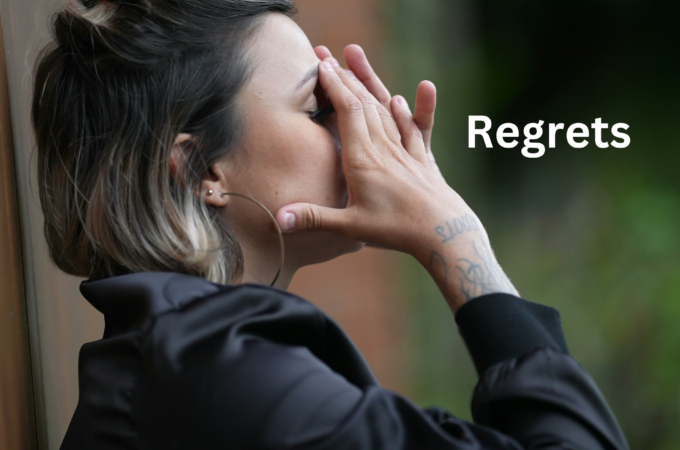While living our lives, there are so many things that feel super important in the moment– but when we look back later, we realize those things weren’t that important after all.
On the opposite end of the spectrum, there are things that we don’t think are that important, but then when we look back at our lives, we realize we should have made them a priority. These often become regrets.
Regrets of the Dying
Regrets are typically most obvious when we are near death. We look over our lives, and realize that there were so many ways we wish we had used our time and energy.
Bronnie Ware, author of The Top Five Regrets of the Dying and a former palliative care nurse, lists the top five (five most common) regrets she heard while working with people who were dying:
- I wish I’d had the courage to live a life true to myself, not the life others expected of me.
- I wish I hadn’t worked so hard.
- I wish I’d had the courage to express my feelings.
- I wish I had stayed in touch with my friends.
- I wish I had let myself be happier.
Let’s look at each of these regrets from a Christian minimalism perspective, and see why they should change how we live our lives right now.
Regret #1: I wish I’d had the courage to live a life true to myself, not the life others expected of me.
It can be difficult to live a life that looks different than those who are around us. Our family and friends, as well as society, have specific expectations about our lives– and we can get sucked into living how we think we should live rather than how God is calling each one of us to live.
Yet, each of us are “fearfully and wonderfully made” (Psalm 139:14), and God has created us as special individuals with different spiritual gifts and skills. We are called to live the life God wants for us, not life others want for us.
Regret #2: I wish I hadn’t worked so hard.
In the United States, employees are working longer and longer hours, even when it’s detrimental to our health. No one on their deathbed wishes they worked more; they often wish that they spent more time on the things that matter most like family/friends, pursuing their God-given vocation/calling, or spending more time with God through Scripture and prayer.
God provides the Sabbath for us for a reason (Exodus 20:8)— we were not created by God to work ourselves to death, but to balance work, rest, and time with loved ones and God.
Regret #3: I wish I’d had the courage to express my feelings.
In Western society, there are emotions that are acceptable to share, and emotions that are supposed to be kept “under wraps.” The problem with society’s unspoken rules about acceptable/unacceptable emotions is that we are humans that were created by God to experience a range of emotions, so suppressing certain emotions will only hurt our emotional well-being in the long-term.
If you are in a place that is safe for you to do so, let yourself feel and express your emotions. Jesus, God in human form, definitely expressed his emotions– he wept (John 11:34), he got angry (Matthew 21:12-13), and he was “moved with compassion” (Luke 7:13). Your emotions are what makes you human. Feel your feelings, and express them safely.
Regret #4: I wish I had stayed in touch with my friends.
Our lives can get so busy that we put catching up with friends on the back-burner. We tell ourselves that we will get together or chat with our friends when there’s more time– and then, we run out of time.
But being in uplifting community with friends is how God wants us to be. We are created to be in community with others.
And let us consider how we may spur one another on toward love and good deeds, not giving up meeting together, as some are in the habit of doing, but encouraging one another—and all the more as you see the Day approaching. (Hebrews 10:24-25)
We are called by God to be supportive and love one another– and we can’t do effectively that if we aren’t connecting with our friends.
Regret #5: I wish I had let myself be happier.
In a consumer society in which more is usually considered better, it can be difficult to be content with what we have. We are encouraged to constantly acquire a better house, better car, better job, better friends, better life.
But Jesus came so that we could have an abundant life (John 10:10); not a life filled with stuff and worldly “success,” but a life that is full of love– love from God and others, and love for God and others. We can be happy without all of the consumer culture trappings that we have been convinced we need (spoiler alert: we don’t!).
No Regrets
Living a simple, intentional life helps us to focus on what’s most important. When we are intentional about how we use our time, talents, energy, and resources, we are better able to live the life God is calling us to live.
This is why Christian minimalism is a hugely important worldview and lifestyle choice. Focusing on the aspects of life that matter most and removing everything else– while also connecting simple living to our Christian faith and spirituality– means that we will probably have less regrets about how we lived our lives.
How is God calling YOU to live a life with no regrets?
Did you like this post? Check out the Christian Minimalism book!


1 Comment
Tracy
November 4, 2024 - 12:08 pmThank you for this article. Exactly what I needed to read at the time I’ve been transitioning from living life my way to living a life that God is calling me for.